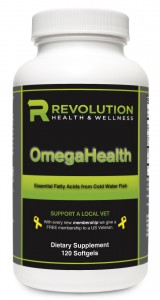Are You Getting Enough Fish Oil (Omega-3’s)?
This article was written by Dr. Chad Edwards, Tulsa’s premier holistic physician.

We perform a test called an ‘Omega-3 Index‘ which quantifies the amount of Omega-3 fatty acids (specifically EPA & DHA) that are incorporated into the surface of the Red Blood Cells. This test has been well studied and correlates well with risk for sudden cardiac death. We strive for an Omega-3 Index of >8% as it correlates to a 90% reduction in risk for sudden cardiac death!
The Omega-3 Index is part of our comprehensive approach to evaluating health so that we can target our interventions to be the most efficient pathway to optimizing our patients’ health.
We want this test on everyone.
Since we get this test on most of our patients, we have the opportunity to evaluate the effectiveness of each patient’s fish oil supplementation. Frequently we’ll get a result of something like 3.8% and tell the patient “you really need to be taking a fish oil supplement” only to hear “I’ve been taking one for the past 2 years!”
The point is that quality matters. You often get what you pay for. Certainly, there are some things where you can cut corners and save some money. Fish oil is NOT one of those and there are several reasons for that.
First, we want a supplement that is pure. No mercury or contaminants. No junk, just good ole EPA & DHA.
We also need to make sure that our supplement has an appropriate amount of EPA and DHA. I’ve talked about this in a previous post (Fish Oil Is A Great Source of Omega-3 Fatty Acids) and it is worth repeating. There are 3 primary forms of Omega-3 fatty acids that are common in supplementation: ALA, EPA, and DHA.
ALA is the plant source of Omega-3’s and is an 18-carbon fatty acid (measures how long it is). It is considered an essential fatty acid as it is not produced in the body from anything else so we have to get it from our diet. However, the purpose of ALA is to make EPA and DHA. The thing to keep in mind about this Omega-3 FA is that the process of converting from ALA to EPA is extremely inefficient and it is difficult to achieve optimal levels through dietary ALA alone.
The problem with this is that many sources of fish oil or omega-3 supplementation will add ALA and count this as a part of the total amount of Omega-3. They aren’t lying, it is an Omega-3. However, I haven’t found it very beneficial.
The key is to make sure you are getting enough EPA & DHA.
Next, we have to consider what Omega-3 fatty acids are… they are polyunsaturated fatty acids (PUFAs). I’ll save the biochemistry of this for another time but suffice it to say that they are subject to oxidation. Oxidation damages the fatty acids. The damaged or oxidized PUFAs are more damaging to health than not taking fish oil at all! Vitamin E (an antioxidant) is often added to protect them from this oxidative damage and preserve their beneficial effects.
To further protect these delicate oils, we need to consume them as close to the point of packaging as possible. It is also a good idea to store them in a cool, dry location. Its probably a good idea to keep them in the refrigerator.
If we purchase fish oils that have been sitting on a shelf for a long period of time there is a greater risk of oxidative damage. The fishy smell that many of these supplements have is due to this oxidative damage and is common in low-quality supplements. If your fish oil tastes or smells fishy (or makes you burp fishy) then there is oxidative damage in them and you should get rid of them.
In summary, fish oil supplementation is an excellent way to improve health, improve lipids, improve the Omega-3 Index, reduce inflammation, reduce the risk of cardiovascular disease, and reduce risk of death. We have to ensure that the fish oil is the highest quality supplement available.
OmegaHealth has the quality and purity that we demand in a supplement at a very affordable price.
Ask us how you can get yours!
References:
- http://www.ncbi.nlm.nih.gov/pubmed/15208005
- http://www.ncbi.nlm.nih.gov/pubmed/18541601
- Omega-3 Index and Sudden Cardiac Death – Mdpi.com
- http://www.omega-3centre.com/index.php?option=com_content&view=article&id=73:a-new-biomarker-for-heart-risk&catid=16:omega-3-index&Itemid=185
- http://www.omega-3-index.com/en/index.php
- http://www.hdlabinc.com/sciencebulletin/New-Laboratory-Tests/omega-3-and-omega-6-fatty-acid-profile






